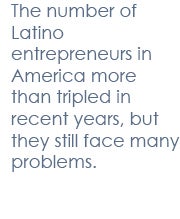Above, watch the full conversation from the “Latinovators: Inventors, Entrepreneurs, and Change-makers” panel, which explores the challenges and successes of Latino entrepreneurship in the innovation economy.
As the 2016 election season begins, it’s clear the growing demographic of Latino voters is highly coveted by candidates from both political parties. Amid the national conversation about the US Latino community, the Aspen Institute Latinos and Society Program recently hosted a Latinos and Society Inaugural Summit featuring conversations with Latino leaders on innovation, entrepreneurship, inclusion, and leadership (watch our Summit video playlist featuring each panel).
“America’s future and growth, America’s international competitiveness, will depend on companies that innovate and use our rich resources, and our Latino community is such a big resource…” said panel moderator and Fusion special correspondent Mariana Atencio in her opening remarks.
Latinos’ Growing Role in the US Economy

When panelist Jorge Benitez, former CEO of Accenture North America, first entered the business world years ago, “There weren’t a lot of people like me,” he said. “I can remember when I first started, people would say to me, “What’s your name?” and, I would say, ‘Jorge…’ And they couldn’t pronounce my name.”
But with the continuing surge in the US Latino population it is estimated that by 2020, Latinos may account for 40 percent of US job growth. Accordingly, the Latino American community will play an increasingly important role in the nation’s economy.
The number of Latino entrepreneurs in the US has also grown exponentially. From 1990 to 2012, this group more than tripled; and by 2012 nearly one in 10 Latinos were engaged in entrepreneurship. This has resulted in more than 3 million Latinos owning small businesses in 2013.
Problems facing Latino Entrepreneurs
Despite the significant growth of Latino American entrepreneurs, they still face myriad problems in business, including lack of assets, high failure rates, and being more likely to come from low-income households despite entrepreneurial efforts.
“In our community, I think the biggest problem is access to capital… because if you’re a CEO you’re raising money your whole seven years or however long it takes to build a strong company…” said Ricardo Garcia, founder of VOIQ (On-Demand Mobile Callforce), a sentiment echoed by other panelists.
Sarahi Espinoza Salamanca, founder and CEO of DREAMers RoadMap, added that another reason most efforts are not met with success is because entrepreneurs not only need funds to start but money to sustain the venture as it develops.
For Latinos pursuing technology startups, access to social capital is yet another obstacle. Tanya Menendez, co-founder and chief marketing officer of Maker’s Row, described her own challenges when beginning her startup journey.
“I didn’t know any other tech entrepreneurs, and getting into technology you have to learn a whole new language,” she said. “You can’t just Google [the answers]. You have to know somebody and you have to meet people who know the answers, and I think that’s a huge part of overcoming the first [difficult] step of getting seed funding and being able to grow.”
“I pitched a lot and there aren’t a lot of people of color who are in decision making positions,” Menendez continued. “I don’t want a special favor from someone who is a person of color but I think having more in common with the person [to whom I am] pitching does make it easier…” she said. “Having people who look and have diverse backgrounds and diverse perspectives can also help, especially in giving access to capital.”
Immigrants are almost twice as likely to become entrepreneurs compared to native-born Americans. But it is often difficult for immigrants to bring their business ventures to fruition. The panelists agreed that there is a need for increasing diversity in the technology and investment world to address the issues underrepresented groups face in pursing entrepreneurial endeavors.

